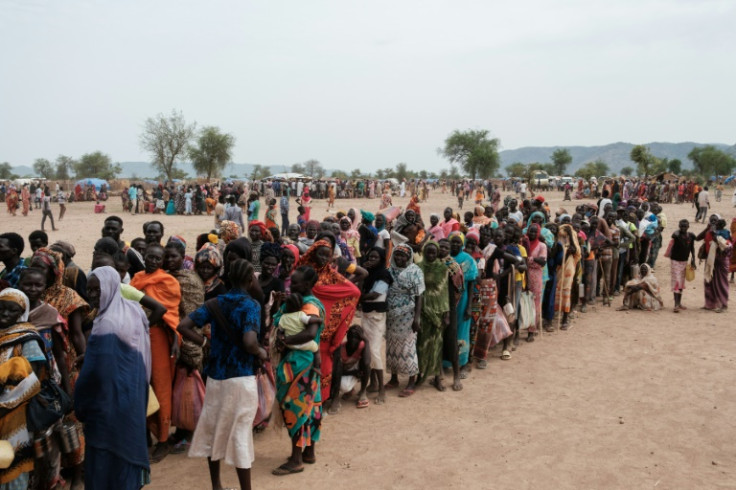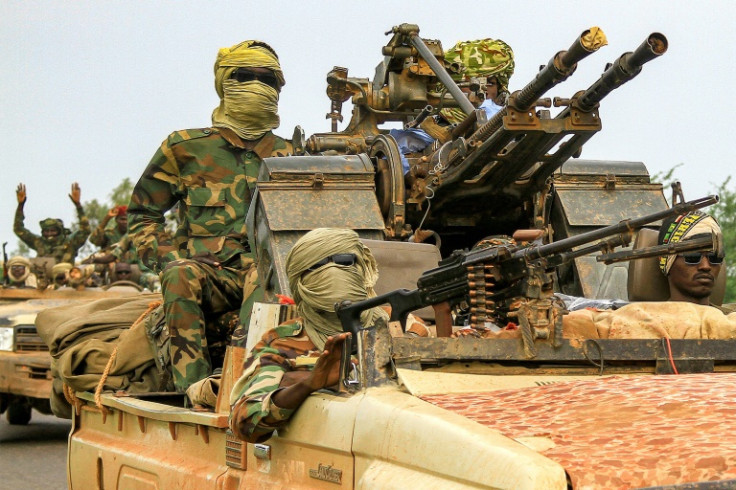Over Half Of Sudanese Face 'Acute Food Insecurity': UN-backed Report

Nearly 26 million people in war-torn Sudan are facing high levels of "acute food insecurity", said a report cited by the United Nations on Thursday.
"For half of Sudan's war-battered population, every single day is a struggle to feed themselves and their families," the United Nations' children's fund, Food and Agriculture Organization and World Food Programme said in a joint statement.
Sudan has been gripped by war since April 2023, when fighting erupted between forces loyal to army chief Abdel Fattah al-Burhan and the paramilitary Rapid Support Forces (RSF) led by his former deputy Mohamed Hamdan Daglo.
The conflict in the northeast African country of 48 million has killed tens of thousands, displaced millions and triggered one of the world's worst humanitarian crises.
"Fourteen months into the conflict, Sudan is facing the worst levels of acute food insecurity" that the Integrated Food Security Phase Classification, or IPC, has recorded, the report said.
The crisis would impact "approximately 25.6 million people," it said, including 755,000 in famine conditions and an additional 8.5 million facing "emergency" situations.
It pointed to "a stark and rapid deterioration of the food security situation" compared with the previous figures published in December, with a 45-percent increase in people facing high levels of acute food insecurity.
"The conflict has not only triggered mass displacement and disruption of supply routes... it has also severely limited access to essential humanitarian assistance, exacerbating an already dire situation," the IPC said.
It further cited "highly dysfunctional health services, water contamination and poor sanitation and hygiene conditions".
The IPC report comes a day after United Nations experts accused both Burhan's Sudanese Armed Forces and Daglo's RSF of "using food as a weapon and starving civilians".
The experts, including the special rapporteur on the right to food, also said foreign governments providing military support to the army or the RSF were "complicit" in war crimes.
Both sides have been accused of attacking activists and aid workers, looting or obstructing aid and targeting infrastructure.
On Thursday, the IPC reported that 14 areas of the country, home to millions of people, were "at risk of famine" that could take hold between June and September 2024 -- coinciding with the rainy season which further isolates remote areas.
The regions -- including besieged El-Fasher in North Darfur, parts of the capital Khartoum and key displacement centres in Darfur and South Kordofan -- are also those most affected by direct fighting.
Some, including Tuti Island in the centre of Khartoum, have been under an effective siege by both forces for over a year.
Aid agencies and the UN have repeatedly warned that the already dire humanitarian crisis could become much worse as the fighting spreads, displacing even more people.
Just this week, thousands were forced to flee the southeastern town of Sennar after an RSF attack on nearby Jebel Moya, eyewitnesses told AFP, raising fears the front line is once again shifting south and east.
Sennar, a key state hosting over half a million displaced people already, connects central Sudan to the army-controlled south and east, where hundreds of thousands more are sheltering.
The IPC report "confirms what humanitarian actors and civilians on the ground already know: famine is at the door", said Tjada D'Oyen McKenna, head of humanitarian organisation Mercy Corps.
"History has shown that by the time a famine is officially declared, people are already dying at a horrifying pace," she added.
If the current humanitarian situation continues, 2.5 million people could die of hunger by the end of September, according to estimates by the Clingendael Institute, a Dutch think tank.
Aid workers have long warned the difficulty of accessing data has prevented the declaration of an all-out famine, but starvation is already claiming lives across the country.
In Darfur, children are already "wasting away from severe malnutrition," humanitarian agency Islamic Relief Worldwide said, calling for the international community to "support a ceasefire" to get the necessary aid in.
Even in the eastern coastal city Port Sudan, the country's new de facto capital under army control, displacement centres are packed with "infants with stick-thin arms" showing "dangerously high malnutrition levels", WFP said.
Severe acute malnutrition makes "children up to 11 times more likely to die than their nourished peers," said Lucia Elmi, UNICEF's director of emergency programmes.
According to WFP country director Eddie Rowe, it is still possible "to avert an outright famine", if agencies are granted "unfettered access" and adequate funding.
By June, the UN's humanitarian response plan for Sudan -- totalling $2.7 billion -- was only 17.3 percent funded.
"Of the many tragedies of Sudan," UN humanitarian chief Martin Griffiths told reporters in Geneva, the funding gap in particular was a "historically shameful fact".


© Copyright AFP 2025. All rights reserved.





















